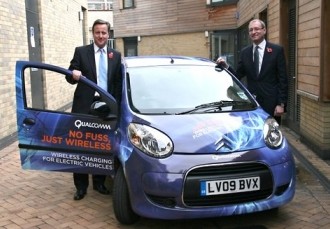Qualcomm announced a new partnership yesterday with French carmaker Renault to begin field trials of its revolutionary wireless electric vehicle charging (WEVC) technology, which if successful could lead to a wider adoption of all-electric vehicles along with various potential uses in other markets. Despite its appeal among environmentally-minded individuals, drawbacks such as a lack of widespread charging stations has stifled growth. WEVC could change that.
In some respects it echoes the joint effort between Samsung and Qualcomm to create a wireless charging standard, but on a much grander scale, the latest venture highlights Qualcomm's continued push into wireless charging technologies following its purchase of leading wireless car charging firm HaloIPT last November.
Qualcomm's technology utilizes a concept involving inductive power transfer with two coils tuned to create a magnetic field to "move" the power from one location to another. For a vehicle to be wirelessly charged, it requires a charging mat embedded in the ground and a receiver installed on the underside of the vehicle. When the vehicle is parked above the "mat," it's charged. By having a wireless charger at work and another on your driveway, it would be possible to keep the battery packs continuously topped up.
"The system will magnetically optimize the connection, so it doesn't matter if you are slightly askew while charging or terrible at parking your car like me," said Andrew Gilbert, executive vice president of European innovation development at Qualcomm, speaking to the NY Times. "This makes the system easy to use and easy to fit."
"Delta Motorsport has developed an advanced passenger EV that is a good platform to demonstrate our Qualcomm Halo Wireless EV Charging in pre-commercial deployments. Delta brings high-performance automotive engineering design to the London WEVC trial and the Delta E-4 Coupe displays technology at the cutting edge of EV innovation," said Qualcomm Europe vice president of business development and marketing Anthony Thomson.
The company will start its trial in London later this year to evaluate the commercial viability of WEVC.
